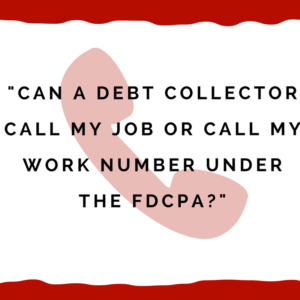Can A Debt Collector Call My Job Or Call My Work Number Under The FDCPA?
Can A Debt Collector Call My Job Or Call My Work Number Under The FDCPA?
 Generally, a debt collector can call your job or your work number.
Generally, a debt collector can call your job or your work number.
However, when you tell them that you are not allowed to receive these types of calls at work, then the calls must stop.
When the calls don’t stop, you sue the debt collector under the FDCPA — Fair Debt Collection Practices Act.
“Why is a collector allowed to call me at work?”
As long as it’s your number, they can contact you at any number they have for you.
In addition, the debt collector has no reason to believe calling you on that number would be a hardship for you.
“Why do debt collectors call my co-workers? Don’t they know this embarrasses me?”
Yes.
That’s why they do it.
It’s called an “office party” — where your co workers are called in order to embarrass you and shame you into paying the debt to stop the abuse.
“Why does telling a debt collector that my work does not allow these calls prevent the debt collector from calling me at work?”
First, that simply is what the law says.
Second, the debt collector can’t call you at a place or time that it knows is inconvenient for you.
If you tell the collector, “Hey, we have a policy not to get these types of non business calls at work” then the collector knows this is inconvenient for you to to receive these types of collection calls at work.
“Do I have to send the debt collector a letter or can I tell them over the phone?”
Either way is fine.
The best way is to send a letter.
Normally, however, you will get the call at work, it will be transferred to you.
Then, you go ahead and tell the collector right then not to call at work because you are not to get these types of calls at work.
Its great if you confirm with a letter but this is not necessary.
Do document the time of your conversation and who you spoke with as this can be helpful when the debt collector lies about the call.
The collector will say you never mentioned not receiving calls at work.
If those calls were recorded by them, they’ve magically disappeared.
It’s not a big deal.
Let the debt collector lie.
However, have the facts written down and be honest.
When they lie, we point out “If they lied to our client, and they came into court and lied to you the jury, what must be done to stop them?”
Very effective.
“If I tell the debt collector not to call and it calls anyway, what happens next?”
You look at suing the debt collector under the FDCPA to get money damages.
This will help the debt collector understand it does not pay to break the law.
It does not pay to have an unfair advantage over other debt collectors who are willing to follow the law.
Instead, it costs them money — money damages to you, attorney fees to your lawyer, and the public display that these collectors can be sued.
“What’s the next step I should take?”
If you live in Alabama, give us a call at 1-205-879-2447.
We’ll be glad to chat with you.
Or you can let us know through filling out our online contact form.
If you live outside of Alabama, we can work with you, if you’re suing in Alabama federal court.
Or, if you have an attorney in your state who wants to associate us as co-counsel.
If this is your situation, use the online contact form please.
Either way, we look forward to hearing from you.
[…] company has been fined $1.75 million in order to settle on allegations that it broke the law when collecting on debts. The fine coincides with rising numbers of consumer complaints about debt collector abuse. This […]
[…] assure no harassment or nothing illegal was being done, Neuweg says […]
[…] was wrong with you.” She engaged in law-breaking practices such as calling late at night and faxing a person’s workplace regarding their debt. If someone didn’t take their calls, she would call their neighbors and […]
[…] Character constraints in texting don’t allow for adequate disclosure and then a more detailed statement of the debt from the collector. Also, billing plans charge recipients for text messages and not the sender, so consumers definitely won’t be happy about paying for texts that tell them they owe money to debt collectors. […]
[…] out” by calling every hour, using profanity, or embarrassing you by calling your neighbors or co-workers. When this happens, you should consider suing the abusive collection agency for violating federal […]
[…] debt collection companies, like Portfolio Recovery Associates, often buy delinquent accounts in bulk quantities. […]
[…] Call at work after you’ve told them you can’t receive such calls. […]
[…] neighbors to have a so-called “block party” to embarrass you. Calling co-workers (an “office party”) to frighten you into payment. Calling family members – nothing like your mother asking you if […]
[…] it go to voicemail”? Simple. Call neighbors. Call family members (particularly ex spouses). Call co-workers. When abusive collectors do this they get results. […]
[…] how they act, debt collectors CANNOT contact third parties to collect debts. They can only contact co-workers or neighbors or other third parties to obtain location information – address, phone number, […]